- Home
- Joseph Bruchac
The Long Run Page 6
The Long Run Read online
Page 6
“Maine,” Travis said. “I am so glad you picked me up. I can’t believe you’re going there.”
“Believe it,” she said, tapping the monitor with her index finger. “Family there? In Maine, I mean.”
“Yes, ma’am,” Travis replied. “My grandparents.”
“Nice. I’ve got me two grandkids. Don’t see them enough. Driving this rig makes it hard for me to get back to see them. Been even harder without Rufus.”
“Rufus,” Travis thought. It was the second time she’d mentioned that name.
Mimi Kinnell turned toward Travis as if she had heard his thoughts. She nodded at him. “My husband,” she said. “We always drove this route together.”
Travis nodded. He thought he knew what she was going to say next, that her husband had died. But she didn’t say it. Maybe she knew she didn’t have to say it from the look in Travis’s eyes.
Mimi Kinnell pointed over her shoulder at a backseat single bed. “We used to take turns sleeping on long hauls. You tired?”
“A little,” Travis said.
“Good. Here’s the drill. You sleep till it gets dark. Then you help keep me awake while I drive through the night. In return I give you the lift to Maine and buy you a few burgers along the way. We got a deal, partner?”
“Deal,” Travis said.
“Good,” Mimi Kinnell grinned. She pulled a pair of ear buds out of her pocket. Travis could hear the faint sounds of a country song coming from them. She inserted them into her ears. “Now I got me a date with my boy Merle Travis. You catch some shut-eye.”
Travis lay back on the bed. He’d never slept in a truck before and the mattress was thin. But the small, hard pillow had a familiar scent. It took him a moment to recognize it as balsam. The pillow had been stuffed with balsam fir needles that smelled just like the trees around his grandparents’ cabin. He closed his eyes, took a deep breath, and relaxed.
The next thing he knew, he felt the truck slowing down and turning. He sat up and leaned forward from the sleeping compartment. It was night and the bright lights of a big city with tall buildings were off to his right. They were so bright they almost didn’t look real to him.
“You’ve been snoring away, partner,” Mimi Kinnell said. “We are now in the windy city of Chicago.”
Travis shook his head. This was the second time he had fallen asleep as hundreds of miles passed by. Maybe if he’d just slept long enough he could have woken up in Maine. But he also felt as if he’d slept too much. His lips were dry, and his tongue felt as if it was covered with fuzz. And he was groggy and felt a little dizzy.
Mimi Kinnell leaned over to look at him. “You look a little out of it, partner. When was the last time you ate?”
Travis thought about that. He wasn’t sure. “Yesterday,” he said, “I guess.”
Mimi Kinnell snorted. “Huh! There’s no way you’re going to keep me awake if you’re fainting from hunger. Come on, let’s get you refueled.”
Three hamburgers, two jumbo fries, and a milkshake later—plus a trip to the truck-stop bathroom—Travis found himself on the road again.
“You either talk or you listen good,” Mimi Kinnell said, sipping from the huge coffee mug she’d filled at the stop.
Travis did his best to do both. He listened to her stories of crossing America again and again with Rufus by her side. “Childhood sweethearts, we was, and all we both ever wanted to do was travel. Just about a perfect life for us, wasn’t it?”
Then Travis talked. He talked about the things his grandparents had told him, even telling her some of the old stories they had shared. He talked about the experiences he’d had so far on the road. But he said nothing about either his father or their life together before he ran away, and Mimi didn’t ask. The miles of the I-90 and state after state sped by. They went through South Bend and Toledo and Cleveland and Erie and Buffalo without stopping or slowing down from the seventy miles per hour she averaged.
“Rufus called me his iron woman,” Mimi said. “He never saw anyone who kept at it hour after hour like me. I never took no pills neither. It just takes coffee to keep me going.” There was both pride and a little catch in her voice as she said that.
It was midmorning when she pulled into a New York State Thruway rest stop.
“We’ll eat here, then you can take the cot again. Unless you’ve learned how to drive this rig by watching me.”
Travis shook his head. “No, ma’am, I have not.”
Mimi laughed and slapped the steering wheel affectionately. “I was just joking, partner. No way I’d ever give over the wheel of my rain-forest baby. But, hey, maybe you want to give your grandparents a call and let them know where you are?”
She pulled an iPhone out of her pocket, unplugged the ear buds, and held it out toward Travis.
He shook his head. “No, thank you. They don’t have a phone . . . and I don’t have one of those either.”
Mimi shook her head. “What? No Twitter? No Facebook friends? Are you the only teenager in the world who doesn’t use one of these?”
Travis grinned. “I didn’t say that. May I?” He took the phone from Mimi, thought for a second, and quickly Googled his own name.
Nothing came up. No “endangered” or “missing” notice. Good!
Then he held the phone up to his mouth.
“Siri,” he said, “what’s the weather tomorrow for Bangor, Maine?”
“The weather forecast for Bangor, Maine, tomorrow is sunny with a high of seventy-five degrees,” the calm female voice replied.
Travis handed the phone back. “I used to have a phone. But right now I just can’t afford one. And I guess I don’t really need it.”
When they took to the highway again, Travis was back in the sleeping compartment. But he couldn’t sleep. Too many thoughts were going through his mind. One of them was how he’d be greeted by his grandparents. He knew they loved him, but would they want him to be staying with them—even for the few months until he could enlist?
He turned his head so he could see the road signs. They passed the signs for Rochester, Syracuse, Utica, and then Albany. Hours were going by as he watched, neither sleeping nor fully awake. They left New York and joined the Mass Pike. After a brief rest stop, they were back on the road. The night closed in around them, with Travis sitting next to Mimi, talking and listening as before.
At one point, at a pause in their conversation, Travis looked at Mimi with amazement. It really was just as her late-husband Rufus had said. She was like a person made of iron. Never tiring, never losing focus as she drove. “If there was a road to the moon,” Travis thought, “she could drive it.”
Three hours later they passed Boston and headed northeast. Another rest stop, then they were passing through Portsmouth in the narrow part of southern New Hampshire.
“Only two hundred miles to Bangor from here, partner,” Mimi said.
Another dawn was breaking when Travis stepped down out of the cab. He’d been on the road with Mimi for a whole day and a half. He breathed in the air. It was just as he remembered it, not the ocean smell from their drive along the coast. It was the scent of evergreens, of countless miles of pine trees. His grandparents’ cabin was in the middle of a pine forest to the north of the road. Their ninety acres could only be reached by logging roads. The property was in the middle of what had been a hunting ground and home for their people for thousands of years.
“You look happy, partner.”
Travis turned to look at Mimi. The grin on her face was so broad that with her reddish skin she looked like a happy jack-o-lantern.
It made him realize he had similar grin on his own face. “And I guess I look a bit like that too,” he thought.
“I am happy,” he said. “I love it here more than anywhere else in the world, Mimi, I mean ma’am.”
Mimi Kinnell let out a deep laugh that Travis felt in his bones. She grabbed him and gave him a hug so hard that he heard his back crack. Then she held him out at arm’s length.
“Partner,” she said, “you are one good kid. And you can call me anything you like. You hear me?”
Travis nodded.
She held out a paper bag to him. “Picked this up at that last stop. Figured you might need a little fuel for this last leg of your journey.”
Travis looked inside. There was an apple, a banana, several candy bars, and three packets of beef jerky.
He looked up at Mimi and took a deep breath. Once again someone had been so kind to him, kinder than he felt he deserved. That lump was back in his throat again.
“Thank you,” he managed to whisper.
“You are more than welcome, Travis.” Mimi grinned again. “Your grandparents are sure as shootin’ gonna be happy to see you. It’s gonna to be like the sun comin’ up for them.”
They’d come a short way off I-95 to a crossroad Travis knew. From there he could hike to his grandparents’ cabin. It was only twenty miles. After the thousands of miles he’d come, twenty miles was nothing.
He waved goodbye as Mimi leaned out the window of the semi. She blew her air horn as she pulled out—seven blasts of it.
WHONK WHONK
WHONK WHONK WHONK
WHONK WHONK
Travis watched until she rounded a curve and went out of sight. He shifted his pack up on his back and stepped onto the logging trail that led into the forest. At first he walked, but then, after only a few hundred yards, he began to run.
10
His Grandparents’ Cabin
As Travis ran, the sounds of his feet striking the earth made him think of a drum—like the drum at the Passamaquoddy Ceremonial Days. His grandparents had taken him there.
“Know your heritage,” Grandma Kailin had said. “It’s there in the songs, even the simplest ones. They always greet you and greet everything else that lives.”
Travis could smell the trees, the moist earth under his feet, and other scents on the wind that were so familiar, even if he couldn’t identify them exactly. There were no sounds of cars, or people, or anything except the Maine woods. He hadn’t realized how much he’d missed being in the forest. He knew it wasn’t peaceful in the sense that everything around him was kind and gentle, like one of those silly cartoon movies. There were birds and animals that ate each other. Even the trees and plants competed with each other as much as they cooperated. You had to be careful in the woods or you could get injured or even die. But that was all right. There was a difference here that he’d missed. Unlike the human-made world, where everything was being used and used up, here things were always in a sort of balance. Whatever lived here eventually fed other life. That was what his grandfather had told him and had shown him.
Once he and Grampa Tomah found a deer antler on the trail behind their cabin.
“Don’t see that often,” Grampa Tomah had said. “Deer antlers are like candy for mice and shrews. The antlers contain minerals that keep them healthy. Come back in a week and that’ll all be gone. Unless you want to take it as a souvenir.”
Travis had shaken his head.
“Good,” Grampa Tomah had replied.
They’d left the deer antler where they had found it.
Travis paused on a ridgetop where he could look out over the forest. He could see smoke rising to the south. Probably from a paper mill. There’d been just a hint of that boiled-cabbage smell in the air when he had left the road. But that and the vapor trails of jet planes high above were the only signs of human beings, other than the old log road he was following. He sat on a thick cushion of moss with his back against a cedar stump and ate a couple of the candy bars, the apple, and the banana. He folded the candy wrappers and put them in the bottom of his pack. He left the apple core and banana peel on top of a big rock, knowing they would soon be found and eaten.
He could have made a fire using his kit, but there was no need for that on this warm day. A fire would be good after the sun went down. The temperature could drop fifty degrees or more this time of year. But by then he would be in the cabin with his grandparents.
It was late afternoon when Travis reached the place where he could look down from the trail and see the cabin. There was a clearing around it and a garden with a fence to keep out the deer. It looked as it always did, and it made his heart swell to see it.
“I just hope they’ll be happy to see me,” Travis thought.
Then he began to notice things that looked strange.
In front of the cabin were the boxes Grandma Kailin had always used to plant petunias. But there weren’t any flowers in them. To the left side of the building was the shed his grandfather had built from logs and rough lumber. The door to the shed was open, and the old pickup truck that they drove was gone.
Travis walked down the hill.
“Hello?” he called out as he neared the house. No one answered or opened the front door. “Hello,” he said again. “Nmahom? Nokomis?” he called, using some of the few words he knew in their language. “Grandfather? Grandmother? It’s me, Travis.”
The door was ajar. He heard sounds coming from inside. But then it grew quiet.
Travis started up the wooden stairs, almost falling as the second step gave way under his weight. It was cracked in the middle and about to break in half. Why had his grandfather not fixed that step? He had always kept up with any repairs that needed to be done.
Travis was on the porch now, the partly open door in front of him. He reached out a hand and pushed the door open wider. It was much darker in the cabin than outside. He could barely see a shadowy shape bent over, like someone who has fallen on his hands and knees.
“Are you all right?” Travis asked, his voice filled with concern.
He was answered by a growl as the shadowy shape stood up from the sugar bowl it had been licking. It was a huge black bear.
“AAAARRROWWW!” it roared, and then charged straight at him.
11
Gone
Travis threw himself backward and to the side. He felt the bear brush past him as he rolled over one shoulder, the way he’d been taught by Master Kwan. The roll took him off the porch. He ended up on his feet just in time to see the bear disappearing into the forest. For a while Travis heard the sounds of its feet crashing through the brush and the huff! huff! huff! of its breath. Then everything was quiet except for the pounding of his heart.
What his grandfather had taught him was true. A black bear cornered by a person will charge. However, what it wants most is just to escape. But if you don’t move out of its way, you could get hurt. Travis remembered a story in the news a year ago. A teenage boy in Canada had been killed when the boy surprised a black bear while it was looking for food in a camp.
Travis went back into the cabin, shut the door behind him, and latched it. Apparently it had not been closed all the way and the bear had been able to push it open.
He searched the small building, afraid of what he might find. Perhaps someone’s body or—like in a movie—the signs of a struggle. All he found was empty rooms. There was no sign of anyone anywhere, including in the small room where he used to sleep when he visited. The guest bed was still there, all made up with a star quilt over the sheets.
His grandparents’ room was just as empty. Grampa Tomah’s pack basket and Grandma Kailin’s old suitcase were gone. So were their few clothes and the toiletries from their bathroom. His grandfather’s hunting rifle and fishing tackle were not in their usual places, nor were his grandmother’s basket-making tools. Either they’d packed up their possessions or someone had done it for them. But where had they gone?
Travis shook his head. There was no way he could figure that out now. The sun was going down and the temperature was dropping. He was exhausted and starting to feel chilled in the dark, cold cabin. There was a pile of wood and a box of kindling next to the fireplace, as well as several candles on the mantle. He didn’t see any matches, but that wasn’t a problem.
He knelt on the hearthstone where Grampa Tomah had taught him the ways to make fire—from u
sing a bow drill to touching a wad of steel wool to the top of a square battery. He took out his knife to make a pile of wood shavings and built a little tipi of sticks over the curls of dry wood. Then he removed the flint-and-steel strike from his fire-making kit. It took him only two tries to strike a spark into the shavings. He leaned close, blowing gently into the pile as first smoke and then flames rose. He added more wood and soon had a warm, roaring fire going. Then, using a burning stick from the fire, he lit two of the candles.
With one hand cupped around the flame, he went back into the kitchen. He found the cup he’d always used on a high shelf. A pitcher half filled with water stood by the pump over the sink. He poured some of the water into the pump to prime it as he worked the handle. Cool, clear water began to flow into the sink. He rinsed his cup and then filled it.
Water from a pump carries the blessing of the earth. That was how Grandma Kailin put it.
Travis lifted the cup. “Thank you,” he said. Then he drank deeply.
There were a few spoons and forks in the dish drainer and some cans of beef stew in the cupboard over the sink. Travis took down one of the cans. He hefted it in his hand, then cut open the lid and took the can back to the fireplace. He placed it close enough to the fire to heat it. When bubbles began to appear in the top of the stew, he used two sticks to slide the can back from the flame. He picked it up using an old dish towel and dipped his spoon in. It tasted heavenly.
After he’d eaten, he took the candle with him to the outhouse a few yards behind the cabin. As always, it was neater than most indoor toilets. There was a stack of his grandfather’s favorite hunting and fishing magazines piled up on a shelf next to the rolls of toilet paper in plastic bags to prevent mice from using them to make nests.
Back inside, Travis built up the fire. He went into his old bedroom and pulled the star quilt over himself. Then, feeling more at home than he’d felt in years, he fell asleep.
When he woke the next morning, he made another search of the cabin. This time he looked in the two wastebaskets. Inside the ash-splint basket in his grandparents’ bedroom he found the answer—a brochure about a place called Deer Meadows.

 Peacemaker
Peacemaker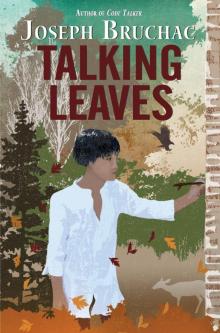 Talking Leaves
Talking Leaves Found
Found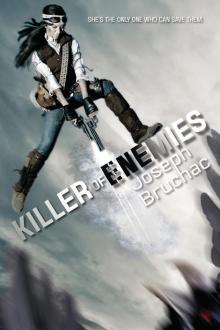 Killer of Enemies
Killer of Enemies Wabi
Wabi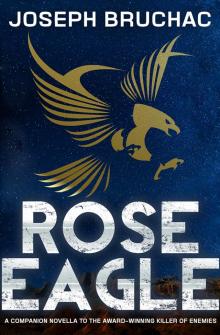 Rose Eagle
Rose Eagle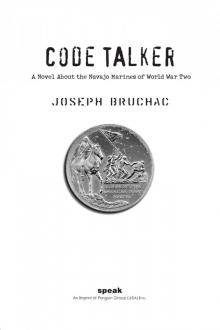 Code Talker
Code Talker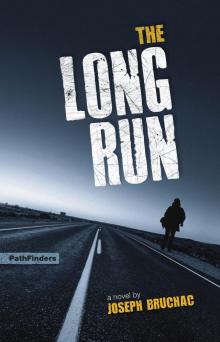 The Long Run
The Long Run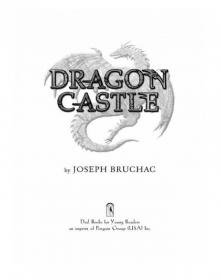 Dragon Castle
Dragon Castle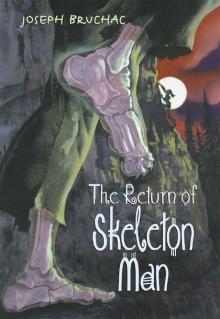 The Return of Skeleton Man
The Return of Skeleton Man Pocahontas
Pocahontas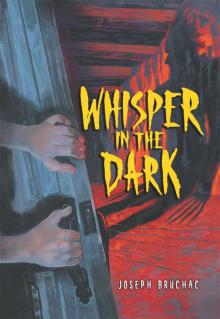 Whisper in the Dark
Whisper in the Dark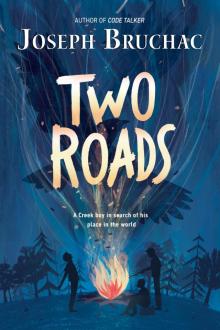 Two Roads
Two Roads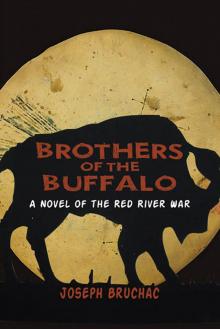 Brothers of the Buffalo
Brothers of the Buffalo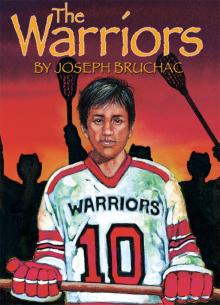 The Warriors
The Warriors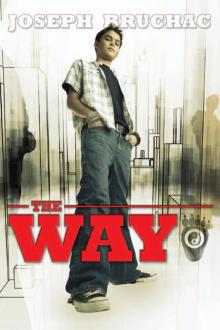 The Way
The Way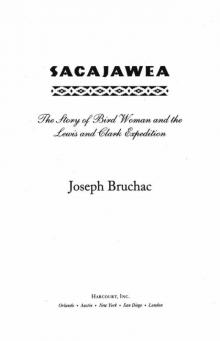 Sacajawea
Sacajawea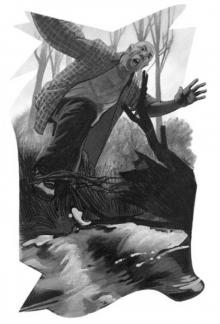 Night Wings
Night Wings March Toward the Thunder
March Toward the Thunder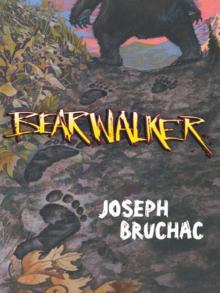 Bearwalker
Bearwalker Skeleton Man
Skeleton Man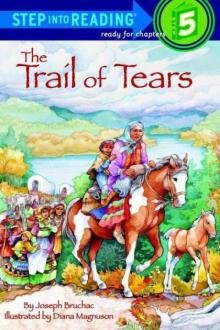 The Trail of Tears
The Trail of Tears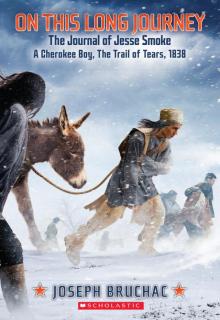 On This Long Journey
On This Long Journey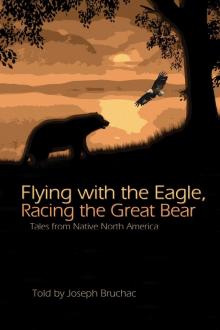 Flying with the Eagle, Racing the Great Bear
Flying with the Eagle, Racing the Great Bear